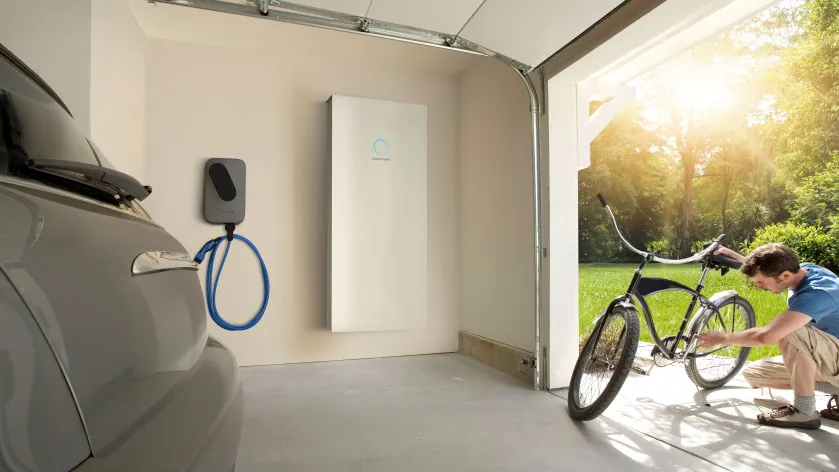In today’s modern world, having a reliable backup power system for your home is becoming more important than ever. Power outages are not only inconvenient, but they can also have a significant impact on our daily lives. Whether it’s losing access to our electronic devices or being unable to heat or cool our homes, the consequences of a power outage can be far-reaching. Fortunately, advancements in technology have revolutionized home backup power systems, making them seamless, secure, and affordable for every household.
The Evolution of Home Backup Power Systems
Traditionally, backup power systems have been associated with high upfront costs and complex installations. They were often seen as a luxury reserved for those with a significant budget or specific energy requirements. However, as technology has advanced, so too have home backup power systems. Today, there are new options available that offer lower upfront costs and easier installation processes.
As the demand for reliable backup power solutions continues to grow, the market has witnessed a significant shift towards more sustainable and cost-effective alternatives. Homeowners are now increasingly turning to innovative backup power systems that not only provide energy security during outages but also contribute to a greener environment.
– Traditional Backup Power Systems: High Upfront Costs and Complex Installation
Traditional backup power systems, such as diesel generators and large lead acid battery banks have long been used to provide electricity during outages. While effective, they come with several drawbacks. These systems often require a significant upfront investment, making them inaccessible for many households. Installation can also be complex, requiring professional assistance and additional equipment.
Furthermore, the reliance on fossil fuels in traditional backup power systems raises concerns about carbon emissions and environmental impact. The maintenance and operational costs associated with these systems can also add up over time, making them a less sustainable option in the long run.
– New Backup Power Systems: Low Upfront Costs and Easy Installation
With the rise of renewable energy sources and advancements in battery technology, new backup power systems have emerged that offer a more affordable, higher voltage and user-friendly alternative. These systems utilise solar power or a combination of solar and grid energy, storing excess electricity in batteries for use during outages. With simpler installation processes and reduced upfront costs, these solutions have become an attractive option for homeowners.
Moreover, the integration of smart technology in modern backup power systems allows for remote monitoring and management, enhancing convenience and control for users. By harnessing clean energy sources and leveraging cutting-edge storage solutions, homeowners can now enjoy reliable backup power without compromising on sustainability or efficiency.
Easy installation and integration into your domestic power system
One of the key advantages of these new backup power systems is their ease of installation. Unlike their traditional counterparts, which often require professional help, these systems can be easily installed by homeowners themselves. With user-friendly interfaces and detailed installation guides, the process is made simple and accessible to everyone.
Additionally, these systems can seamlessly integrate with your existing domestic power system. They can be connected to your main electrical panel, allowing them to take over automatically in the event of a power outage. This integration ensures a smooth transition without any disruption to your daily activities.
Furthermore, the compact design of these modern backup power systems allows for versatile installation options. Whether you prefer wall mounting or floor placement, these systems can adapt to your specific space requirements. This flexibility ensures that you can optimise the placement of your backup power system for convenient access and efficient operation.
Moreover, the advanced technology incorporated into these systems enables remote monitoring and control capabilities. Through dedicated mobile apps or online platforms, homeowners can conveniently check the status of their backup power system, monitor energy usage, and even adjust settings from anywhere in the world. This level of connectivity provides peace of mind and empowers users to stay in control of their power supply at all times.
Exploring Seamless Integration into Everyday Life
Seamless integration is not just about powering your home during outages. These new backup power systems are designed to seamlessly integrate into your everyday life, offering benefits even when the grid is up and running. For example, with integrated energy management systems, you can monitor and control your energy usage, ensuring optimal efficiency and cost savings.
Some systems even allow for integration with smart home technology, enabling you to control your backup power system remotely through your smartphone or other devices. This level of control provides peace of mind, knowing that you can monitor and manage your home’s energy consumption at any time, from anywhere.
Furthermore, the seamless integration of backup power systems into everyday life extends beyond just energy efficiency. These systems can also enhance the overall safety and security of your home. In the event of a power outage, having a reliable backup power source can ensure that essential security systems, such as alarms and cameras, remain operational, keeping your home and loved ones protected.
Moreover, the integration of backup power systems with smart home technology opens up a world of possibilities for creating a truly connected and automated living space. Imagine being able to set customised energy usage schedules based on your daily routines or receiving instant alerts on your phone if there are any issues with your power supply. The seamless blend of convenience, efficiency, and security makes these integrated systems a valuable addition to any modern home.
A few Solutions on the market
– Tesla Powerwall 3
Tesla’s Powerwall 3 is a very popular small home and is widely regarded as one of the leading home backup power solutions on the market. With its sleek design and advanced battery technology, it can store excess energy generated from solar panels or the grid, ready to be used during outages. The Powerwall 3 also boasts seamless integration with Tesla’s energy management system, allowing homeowners to monitor and control their energy usage with ease.
– EcoFlow DELTA Pro Ultra
The EcoFlow DELTA Pro Ultra is another innovative solution that offers seamless and affordable partial backup power for small households. This portable power station is equipped with a high-capacity battery, which is capable of powering essential appliances and devices during outages. With its lightweight design and user-friendly interface, the DELTA Pro Ultra is an excellent option for those looking for a versatile and easy-to-use backup power system.
– Victron Energy Home Power Solutions
Victron Energy offers a range of home power solutions that cater to different energy needs and budgets. Their backup power systems incorporate high-quality components and advanced technology to deliver reliable and efficient performance. While installation costs may be slightly higher compared to some other options, Victron Energy’s solutions are known for their durability and long-term value.
It’s important to note that while Victron Energy’s home power solutions may have higher installation costs, they offer excellent reliability and performance. For those willing to invest in a long-term solution, Victron Energy’s offerings are worth considering especially for off-grid solutions that require a lot of flexibility.
– Sigenergy 3phase UPS
Sigenergy offers a range of innovative energy solutions, including a 3-phase UPS (Uninterruptible Power Supply) designed to ensure seamless power backup and energy management. At the time of writing they are by far the best, and most feature rich solution for large projects with the esiest commioning.
Choosing the Right Backup Power Solution
When it comes to choosing the right backup power solution for your home, it’s crucial to consider various factors such as cost, reliability, installation costs and ease of use. While Tesla Powerwall 3 and EcoFlow DELTA Pro Ultra are popular options, it’s worth exploring other alternatives to find the perfect fit for your specific needs.
One such alternative is the Sonnen, a cutting-edge home battery system that combines sleek design with intelligent energy management. This German-engineered solution not only stores excess energy but also optimizes its usage based on your household’s consumption patterns. With its advanced software and integration capabilities, the Sonnen Eco ensures efficient energy utilization, reducing your reliance on the grid and maximizing your savings.
For those seeking a more budget-friendly option without compromising on performance, the Enphase Encharge is worth considering. This modular backup power system allows you to start small and expand as needed, making it a flexible choice for homeowners. With its reliable battery technology and user-friendly monitoring app, the Enphase Encharge offers peace of mind during power outages without breaking the bank.
Eco-Friendly Backup Power Solutions for Sustainable Living
As more people prioritise sustainable living, it’s essential to explore backup power solutions that align with this ethos. Many of the new home backup power systems utilise renewable energy sources such as solar power. By harnessing clean energy, these systems not only reduce reliance on the grid but also minimise environmental impact.
In addition to utilising renewable energy, these systems also prioritise energy efficiency. With smart energy management features, homeowners can optimise their energy usage, ensuring that no power goes to waste. This commitment to eco-friendly solutions not only benefits the planet but also helps homeowners reduce their energy bills.
Furthermore, the advancement of technology in the field of eco-friendly backup power solutions has led to the development of innovative battery storage systems. These batteries can store excess energy generated by renewable sources during peak production times, allowing homeowners to use that stored energy during periods of high demand or when renewable sources are not producing electricity. This not only increases self-sufficiency but also contributes to a more stable and reliable energy supply.
Moreover, some eco-friendly backup power solutions come with monitoring and control capabilities that enable homeowners to track their energy consumption in real-time. By providing detailed insights into energy usage patterns, homeowners can make informed decisions to further optimise their energy consumption and reduce their carbon footprint.
The Future of Home Backup Power Technology
As technology continues to advance, the future of home backup power systems looks promising. Ongoing innovations in battery technology and renewable energy sources will likely result in even more affordable, efficient, and eco-friendly solutions. We can expect increased integration with smart home technology, further simplifying the management and control of backup power systems.
Additionally, advancements in energy storage capacity will offer homeowners extended periods of backup power, ensuring their essential needs are met even during prolonged outages. These developments will undoubtedly transform the way we think about backup power, making it an essential aspect of every home.
One exciting aspect of the future of home backup power technology is the potential for microgrid systems. These systems allow homeowners to disconnect from the main power grid during outages and operate independently. By combining renewable energy sources like solar panels with energy storage solutions, microgrids provide a sustainable and reliable source of backup power.
Furthermore, the integration of artificial intelligence (AI) into home backup power systems is set to revolutionise energy management. AI algorithms can optimise energy usage, predict power outages, and even automatically switch between power sources to ensure an uninterrupted electricity supply. This level of automation and intelligence will not only enhance convenience for homeowners but also contribute to a more stable and efficient energy grid.





